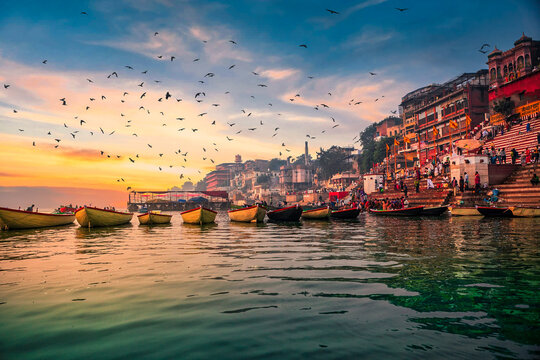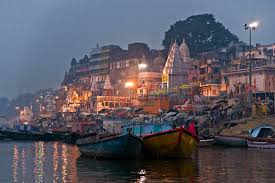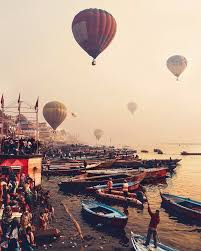
Table of Contents
Varanasi

Varanasi, the spiritual heart of India, is a city that transcends time. Nestled along the sacred Ganges River, it is believed to be one of the world’s oldest continuously inhabited cities. The city’s ancient ghats, such as Dashashwamedh and Manikarnika, witness thousands of pilgrims performing rituals and seeking spiritual salvation.
Varanasi is home to the revered Kashi Vishwanath Temple, a symbol of divine devotion. The mesmerizing Ganga Aarti, with its glowing lamps and soulful chants, creates an unforgettable spiritual experience. The narrow alleys of the city echo with history, offering glimpses of vibrant markets, traditional silk weaving, and centuries-old heritage.
Beyond spirituality, Varanasi is a cultural treasure trove, inspiring poets, artists, and philosophers for generations. Whether you seek enlightenment, history, or culture, Varanasi promises a profound journey through the essence of India’s soul. A visit here is not just a trip—it’s a transformative experience.
The Spiritual Significance of Varanasi
Varanasi is considered the holiest of the seven sacred cities in Hinduism. According to mythology, Lord Shiva himself founded the city, and it is believed that a dip in the sacred Ganges River here washes away sins and grants salvation (moksha). The ghats of , where countless rituals, prayers, and cremations take place, are the heart of the city’s spiritual energy.
Pilgrims from across India and beyond visit to perform religious rites, including the Pind Daan ritual for their ancestors, believing it helps the departed souls attain peace. The city is also significant in Buddhism, as it is near Sarnath, where Lord Buddha delivered his first sermon after attaining enlightenment. Varanasi has been a center for learning, philosophy, and spirituality for centuries, drawing sages, scholars, and seekers in search of divine wisdom.
Varanasi’s unique spiritual energy is deeply embedded in its way of life. The city’s air is filled with the constant chanting of hymns, the ringing of temple bells, and the fragrance of incense, creating an atmosphere of devotion and mysticism. Many believe that dying in ensures liberation from the cycle of rebirth, making the city a final resting place for countless devotees.
Exploring the Majestic Ghats
Varanasi is famous for its ghats—stone steps leading down to the river—where religious ceremonies and daily life unfold in a captivating blend of devotion and tradition. Some of the most iconic ghats include:
- Dashashwamedh Ghat – Known for its grand Ganga Aarti, where priests perform synchronized rituals with fire lamps and chanting.
- Manikarnika Ghat – One of the main cremation ghats, believed to grant moksha to the departed souls.
- Assi Ghat – A peaceful spot where visitors can witness the city’s spiritual essence while enjoying a serene boat ride.

Kashi Vishwanath Temple – The Spiritual Heart of Varanasi
One of the most revered temples in Hinduism, the Kashi Vishwanath Temple is dedicated to Lord Shiva. This temple attracts millions of devotees each year, who seek the divine blessings of the deity. The temple is considered a must-visit for those exploring Varanasi’s religious and cultural richness.
The Enchanting Ganga Aarti
The Ganga Aarti at Dashashwamedh Ghat is an awe-inspiring experience. Every evening, the ghats come alive with the sound of conch shells, the rhythmic chanting of hymns, and the sight of priests performing synchronized movements with large fire lamps. This sacred ritual is a mesmerizing spectacle that leaves visitors in awe of the city’s spiritual fervor.
The Ancient Alleys of Varanasi
Beyond the ghats, Varanasi’s narrow, winding alleys offer a glimpse into the city’s deep-rooted heritage. These streets are lined with centuries-old temples, traditional silk-weaving shops, and street vendors selling mouthwatering local delicacies like kachori, jalebi, and the famous Banarasi paan.
Varanasi’s Rich Cultural and Artistic Heritage
Varanasi is not only a religious hub but also a center of art, music, and literature. The city has inspired poets like Tulsidas and Kabir, while its classical music traditions have been preserved for centuries. Banarasi silk sarees, known for their intricate craftsmanship, are a hallmark of artistic excellence.

Best Time to Visit Varanasi
The ideal time to visit Varanasi is between October and March when the weather is pleasant and suitable for exploring the city. Festivals like Diwali, Dev Deepawali, and Maha Shivaratri are celebrated with grandeur, adding to the city’s spiritual charm. During these months, the cool temperatures make it comfortable to explore the ghats, temples, and bustling markets without the extreme summer heat or monsoon rains.
Winter (December to February) offers misty mornings, creating an ethereal atmosphere on the ghats, while autumn (October-November) is perfect for experiencing the grand Dev Deepawali festival, when thousands of oil lamps illuminate the riverbanks. Spring (February-March) is another great time to visit, with Holi celebrations adding a splash of color to the city’s streets.
If you visit during the monsoon season (July-September), be prepared for occasional heavy rains that may limit boat rides and outdoor activities. The summer months (April-June) can be scorching, with temperatures soaring above 40°C, making it less favorable for sightseeing. However, this period sees fewer crowds, offering a more peaceful experience at temples and ghats.
Conclusion
A journey to Varanasi is not just a travel experience—it is a spiritual awakening. Whether you seek solace, history, or culture, this city leaves a profound impact on every visitor. The divine aura, the chants echoing through the ghats, and the timeless traditions make a destination that must be experienced at least once in a lifetime. Walking through the historic alleys, witnessing the rituals by the river, and immersing in the city’s vibrant culture offer a perspective that stays with you forever. The sense of peace and devotion that exudes is unparalleled. The city invites you to connect with yourself, to pause and reflect, and to embrace its sacred beauty.
Every traveler to Varanasi carries back a part of its soul—be it through spiritual enlightenment, cultural appreciation, or a newfound sense of inner peace. Whether it’s your first visit or a return pilgrimage, always welcomes you with open arms, ready to share its wisdom and heritage. If you seek an experience that goes beyond sightseeing, that touches the heart and stirs the soul, then is the place to be.

Varanasi Map
Follow More Article
